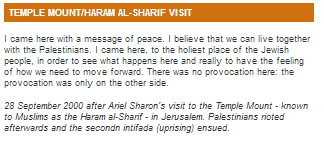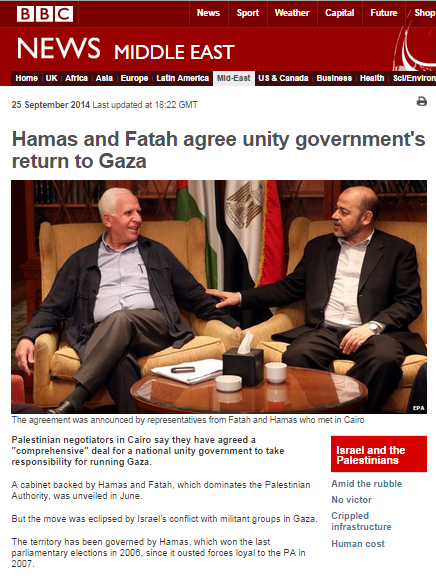On January 12th we noted here that just hours after the death of Ariel Sharon, the BBC News website continued to promote the myth that his September 28th 2000 visit to Temple Mount was the cause of the second Intifada. After that article was written, three additional items appeared on the website promoting the same falsehood.
In an item titled “In quotes: Ariel Sharon” a note was added to one of several Sharon quotes selected by BBC staff for that feature.
Also appearing on the website on January 12th was a filmed report dedicated to a telephone interview with Mustafa Barghouti in which – with his inaccuracies unchallenged by the BBC – he claimed:
“The worst memory is that he [Sharon] practically undermined and destroyed the peace process – the Oslo process – when he visited the Al Aqsa mosque and launched a campaign against the implementation of the peace process…”
In an article dated January 13th Yolande Knell wrote:
“…his [Sharon’s] controversial visit in 2000 to Jerusalem’s al-Aqsa Mosque Compound, known to Jews as Temple Mount. The walkabout on the contested site infuriated Palestinians, who launched the second intifada (or uprising).”
To sum up, we see that on January 1st the BBC News website had produced a new profile of Sharon which included the second intifada myth and that in the subsequent ten days no fewer than fourteen links to that profile were promoted in five separate articles. In addition, over the following three days, the same myth appeared in the BBC News website’s obituary, in an “In Pictures” feature, in an article by Kevin Connolly and in another by Yolande Knell, in the above-mentioned “In Quotes” feature, in a filmed report by Jeremy Bowen and in the interview with Barghouti.
In other words, BBC audiences were provided with versions of the same inaccurate and misleading information on at least eight separate occasions on the website alone. With Bowen’s report also having appeared on BBC television news programmes and the interview with Barghouti having been broadcast on BBC radio stations, clearly the extent of the promotion of this falsehood is considerably wider.
But why? Why should the BBC have adopted hook, line and sinker a narrative which has been shown to be incorrect on countless occasions – ironically primarily by Palestinian leaders and personalities? And why does an organization which claims to aspire to be the “standard-setter for international journalism” and is supposedly committed to rigorous standards of accuracy continue to widely and deliberately promote a clear falsehood?
We can of course only guess the answers to those questions, but certainly the embalming of this simplistic myth is the easy option for journalists. The alternative would involve detailing for audiences the long list of terror attacks against Israeli citizens which took place between the signing of the Declaration of Principles in September 1993 and the start of the second Intifada seven years later and in which some 269 Israelis were killed and many hundreds more injured. Significantly, that turbulent period – which remains etched in the memories of Israelis – does not even appear on the BBC News website’s timeline of Israeli history,which jumps straight from the Oslo Accords of  1993 to the second Intifada of 2000 as though nothing of importance happened in between.
1993 to the second Intifada of 2000 as though nothing of importance happened in between.
Likewise, any honest appraisal of the factors which brought about the second Intifada would have to include Yasser Arafat’s failure to rein in the terror activities of rejectionist factions and to prepare the Palestinian leadership and people for peace with their neighbours during those seven years, as well as a frank account of his performance at Camp David in July 2000.
“Immediately after the failure of the Camp David [negotiations], I met him [Arafat] in Paris upon his return…. Camp David had failed, and he said to me, ‘You should remain in Paris.’ I asked him why, and he said, ‘Because I am going to start an intifada. They want me to betray the Palestinian cause. They want me to give up on our principles, and I will not do so.” Suha Arafat speaking to Dubai TV, December 2012.
All that, however, is completely erased from the BBC’s narrative, according to which hitherto peace-loving Palestinians were simply unable to resist being provoked into starting a campaign of violence and terror when the leader of an opposition party in Israel paid a thirty-four minute visit to the most important Jewish holy site during normal visitor opening hours which was pre-coordinated days beforehand with the PA security forces.
Whilst the promotion of that simplistic narrative might save a lot of writing hours, it does nothing for the BBC’s reputation as an organisation committed to accuracy. Neither does it indicate that BBC journalists regard the Palestinian people and their leadership as having any sort of agency or responsibility and such an obvious display of the bigotry of low expectations may well be seen as compromising the BBC’s impartiality.
Unlike most BBC radio or television broadcasts, material published on its website remains in the public domain for many years to come. That website already includes significant amounts of inaccurate and misleading information on the subject of the second Intifada. Now, over a decade on, instead of rectifying that situation the BBC is adding yet more of the same to what it describes as its “permanently accessible archive“.
Related Articles:
BBC exploits Sharon’s death for more promotion of second Intifada falsehood
BBC second Intifada backgrounders: ‘Sharon started it’
As Sharon’s health deteriorates, BBC updates profile claiming he sparked second intifada
Eleven links in four BBC articles promote baseless second Intifada myth
With Ariel Sharon’s Death, Expect the Usual Falsehoods (CAMERA)





